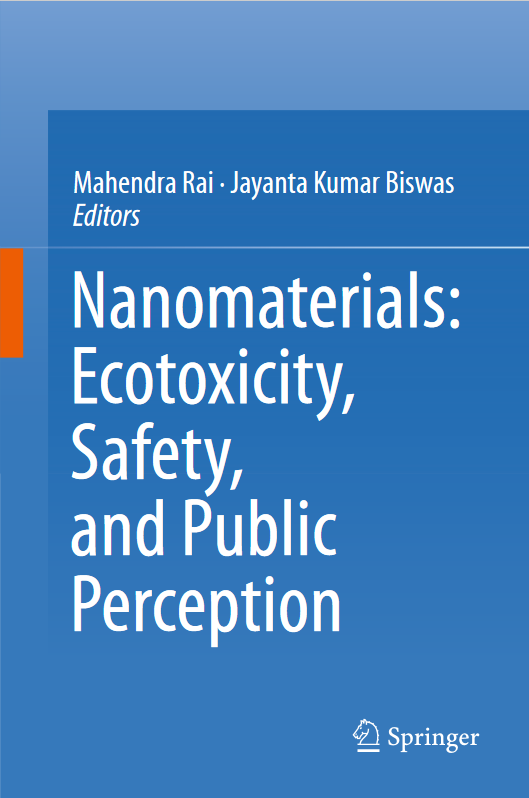Newly released
This book is new and will be uploaded as soon as it becomes available to us and if we secure the necessary publishing rights.

Nanomaterials: Ecotoxicity, Safety, and Public Perception Book PDF
(0)
Author:
Mahendra RaiNumber Of Reads:
60
Language:
English
Category:
TechnologySection:
Pages:
377
Quality:
excellent
Views:
591
Quate
Review
Save
Share
Book Description
The environment is prone to suffer pollution and toxic insult from generations of nanomaterials as well from accidental releases during production, transportation, and disposal operations. The NMs could interact with and cause adverse biological effects at cellular, subcellular, and molecular levels. Assessing potential environmental/ecological risks requires quality information on transport and fate of nanoparticles in the environment, exposures and vulnerabilities of organisms to the nanomaterials and standard methods for assessing toxicity for aquatic or terrestrial organisms and human health. The systematic risk characterization and evaluation of the safety of nanomaterials require a multidisciplinary approach and convergence of knowledge and efforts from researchers and experts from toxicology, biotechnology, materials science, chemistry, physics, engineering, and other branches of life sciences. Although studies are beginning to appear in the literature addressing the toxicity of various nanomaterials and their potential for exposure, at this stage definitive statements regarding the impacts of nanomaterials on human health and the environment remain sketchy requiring an increased level of precautions with regard to nanomaterials, as has happened with other emerging contaminants and technologies (e.g., biotechnology). The need for an increased level of understanding the perception of risk and of benefits will vary and is likely to influence public, regulatory, and non-governmental activities regarding risk and benefit evaluations. Systematic identification and assessment of the risks posed by any new technology are essential. A prudent, integrated, and holistic approach is required to develop best practices based on the scientific understanding about what we know and what we don’t know but need to know. Nanomaterials addresses key issues of ecotoxicological actions and effects of nanomaterials on life and environment, their threats, vulnerability, risks, and public perception. The readers learn to read bad news objectively and think about and search for ecological ‘green’ solutions to current environmental and ecological problems with blue, grey, brown, and red shades for building a sustainable ecosystem. It shows how this molecular terrain is a common ground for interdisciplinary research and education that will be an essential component of science, engineering and technology in the future. The book is divided into three sections. Section I includes general topics related to ecotoxicity of nanomaterials to microbes, plants, human and environment. Section 2 incorporates risks generated by the use of nanomaterials. Section 3 discusss safety issues and the public.
Mahendra Rai
Dr. Mahendra Rai is a Senior Professor and UGC-Basic Science Research Faculty at the Department of Biotechnology, Sant Gadge Baba Amravati University, Amravati, Maharashtra, India.
Professor Rai has published more than 400 research papers in Indian and foreign peer reviewedjournals, 50 books in association with some reputed publishers such as Springer, Elsevier, CRC, Taylor and Francis and Scientific Publisher, and more than 102 popular articles. Professor Rai’s research has provided seven patents. He is a member of several scientific societies. His area of expertise includes microbial biotechnology and nanobiotechnology. Currently, the main research interest of his group is biogenic synthesis of metal nanoparticles particularly using fungi and their applications as nanoantimicrobials against multidrug resistance microbes. He believes that silver nanoparticles are the new generation of antimicrobials because of their potential against human pathogenic microbes and also for possibility of solving the problem of drug resistance by using a combination of the silver nanoparticles with different antibiotics. His research is highly interdisciplinary and combines microbial biotechnology with nanotechnology. He aims to focus on understanding the mechanism of biological synthesis of metal nanoparticles by microbes and also the toxicity issues. Recently, he has been interested in using of nanoparticles for the management of plant pathogens.
He has received several prestigious awards, including the father T.A. Mathias award (1989) from the All India Association for Christian Higher Education, and the Medini Award for book on Herbal Medicines by the Government of India. He also visited Brazil under TWAS-UNESCO Associateship (2002, Italy), as a Visiting Scientist at the Department of Bioenergetics, University of Geneva, Switzerland (2004), under Hungarian Scholarship to visit the Department of Plant Protection, Debrecen University, Hungary (2006, 2008, 2015), as a Visiting Professor, Department of Microbiology, Nicolaus Copernicus University, Torun Poland (2012, 2014, 2015); also as a Visiting Scientist, Biological Chemistry Laboratory, State University of Campinas under Indo-Brazil programme (2009-2012), and in 2013 under FAPESP programme. In 2015 (October- November), he was a visiting scientist at Nanotechnology Center, VSB Technological University of Ostrava.
Dr. Rai serves as a referee for 20 international journals and is a member of the editorial board of ten national and international journals. He has approximately three decades of teaching and research experience.
Dr. Rai has numerous international collaborations, including Argentina, Hungary, Switzerland, Italy, Germany, Brazil and USA in microbial biotechnology and nanobiotechnology.
Book Currently Unavailable
This book is currently unavailable for publication. We obtained it under a Creative Commons license, but the author or publisher has not granted permission to publish it.
Rate Now
5 Stars
4 Stars
3 Stars
2 Stars
1 Stars
Nanomaterials: Ecotoxicity, Safety, and Public Perception Quotes
Top Rated
Latest
Quate
Be the first to leave a quote and earn 10 points
instead of 3
Comments
Be the first to leave a comment and earn 5 points
instead of 3